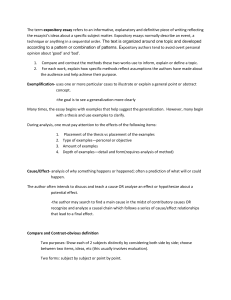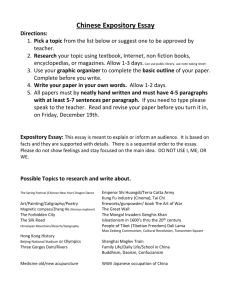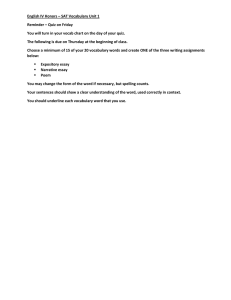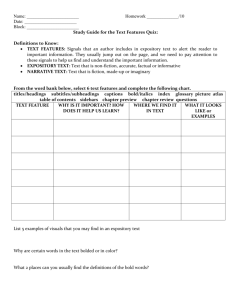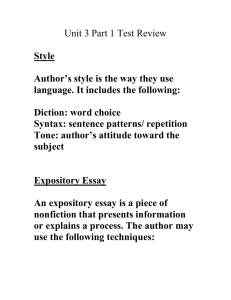Fall 2014 - AFRAS 200 Composition & Research Monday/Wednesday/Friday
advertisement
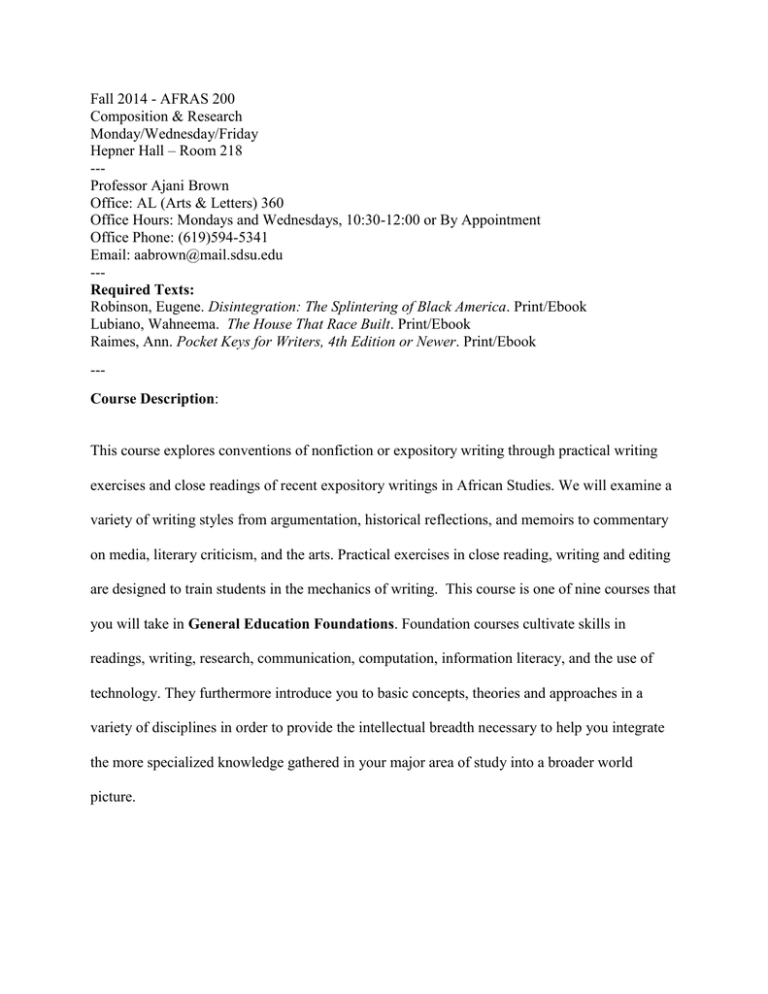
Fall 2014 - AFRAS 200 Composition & Research Monday/Wednesday/Friday Hepner Hall – Room 218 --Professor Ajani Brown Office: AL (Arts & Letters) 360 Office Hours: Mondays and Wednesdays, 10:30-12:00 or By Appointment Office Phone: (619)594-5341 Email: aabrown@mail.sdsu.edu --Required Texts: Robinson, Eugene. Disintegration: The Splintering of Black America. Print/Ebook Lubiano, Wahneema. The House That Race Built. Print/Ebook Raimes, Ann. Pocket Keys for Writers, 4th Edition or Newer. Print/Ebook --Course Description: This course explores conventions of nonfiction or expository writing through practical writing exercises and close readings of recent expository writings in African Studies. We will examine a variety of writing styles from argumentation, historical reflections, and memoirs to commentary on media, literary criticism, and the arts. Practical exercises in close reading, writing and editing are designed to train students in the mechanics of writing. This course is one of nine courses that you will take in General Education Foundations. Foundation courses cultivate skills in readings, writing, research, communication, computation, information literacy, and the use of technology. They furthermore introduce you to basic concepts, theories and approaches in a variety of disciplines in order to provide the intellectual breadth necessary to help you integrate the more specialized knowledge gathered in your major area of study into a broader world picture. Communication and Critical Thinking: Upon completing this area of your General Education Program, you will be able to: 1) Craft well-reasoned arguments for specific audiences; 2) Analyze a variety of texts commonly encountered in the academic setting; 3) Situate discourse within social, cultural and historical contexts; and 4) Assess the relative strengths of arguments and supporting evidence. AFRAS 200 explores research strategies and uses readings and media material from Africana Studies as writing models and opportunities for students to consider ideas to help them develop cogent thoughts in a variety of essays. Course Goal: To develop competency in the use of university level writing techniques. Course Objective/Outcome: At the end of this course students should be able to critically read and analyze a variety of texts on African American culture: Identify and discuss author thesis/hypothesis. Demonstrate use of a variety of rhetorical strategies (descriptive, definition, personal narrative, persuasive, explicative, etc.) in practical class exercises with specific prompts. Evaluate controversial concepts embedded in a variety of African American texts. Write a critical opinion essay about a controversial topic with major points of supporting detail or illustration. Use reflection as a way to engage thoughts through a reading/reaction log. Use current research methodologies, apply class concepts and demonstrate ability to discuss research findings in an interdisciplinary paper: 1. Use of multiple information sources 2. A clear thesis 3. One main argument 4. Adequately developed coherent and unified paragraphs 5. MLA documentation Evaluation: In order to access learning and to assist in developing an inner dialogue with the course content, you will be responsible for a variety of assignments. Point allocations for each assignment are as follows: Assignments: In-Class Writings (300 Words) 4 x 25 points = 100 Text Reaction Papers (500 Words) 2 x 50 points = 100 Expository Essays (800 Words) 4 x 75 points = 300 ______________________________________________ Total Points 10 x Assignments = 500 Grading Standards: Option: Credit 300 points/No Credit 299 points and below Grading Scale: Grades and Credit/no credit option 475-500 A 451-474 A425-450 B+ 400-424 B 375-399 B350-374 C+ 325-349 C 300-324 C275-299 D 275-Below F Assignment Guidelines: All out of class essays will be typed, doubled spaced, using Times Roman 12 point font, with left/right and top/bottom margins of 1”. Papers are to be typed on one side only. A Title Page is not required; however, include Your Name, Class Title (AFRAS 200), Professors Name (Brown) and the Assignment Title (Expository Essay #1, 2, 3, or 4) on the first page, upper left hand corner. Blackboard: Additional readings and course updates will be posted to Blackboard. Alterations to the instructional syllabus may happen, so consult a classmate if absent. Academic Expectations: This course will refer to topics from across the Africana Studies Department Curriculum and also issues that touch courses from other disciplines. Some issues and socio-cultural dynamics have no clearly defined answers. We will discuss these as a class. Let us respect each other’s thoughts. Disagree academically if we must, but offer sound disputation in defense of a position. Late Assignments: Assignments must be handed in on time unless other arrangements have been made in advance with the professor. Attendance: It is your responsibility to attend each class, unless otherwise excused. You are responsible for all notes and missed work. “Partner-up” with someone and also use group members as resources, especially if you have to miss class. If you want to succeed in this course, you will need to attend regularly and actively participate. Accessibility: If you are a student with a disability and believe you will need accommodations for this class, it is your responsibility to contact Student Disability Services at (619) 594-6473. To avoid any delay in the receipt of your accommodations, you should contact Student Disability Services as soon as possible. Please note that accommodations are not retroactive, and that accommodations based upon disability cannot be provided until you have presented your instructor with an accommodation letter from Student Disability Services. Your cooperation is appreciated. Class Schedule: Week 1: Introductions to the course Week 2: Lecture: The Writing Process & Discussion: Disintegration - Chapter 1 Week 3: Discussion: Disintegration - Chapters 2 & 3 Brainstorm for Expository Essay #1 Week 4: Discussion: Disintegration - Chapters 4 & 5 In-Class Writing #1 Friday: 800 Word Expository Essay #1 Due Week 5: Discussion: Disintegration - Chapters 6 & 7 View On-Topic Documentary/Film Week 6: Discussion: Disintegration - Chapters 8 & 9 In-Class Writing #2 Week 7: Discussion: Disintegration - Chapter 10 Brainstorm for Expository Essay #2 Friday: 500 Word Text Response Due Week 8: View On-Topic Documentary/Film Discussion: The House That Race Built – Introduction by the author, Home by Toni Morrison, The Liberal Retreat…by Stephen Steinberg Friday: 800 Word Expository Essay #2 Due Week 9: In-Class Writing #3 Discussion: The House That Race Built – White Workers, New Democrats...by David Roediger, Tales of Two Judges by Neil Gotanda, Racial Dualism by Howard Winant Brainstorm for Expository Essay # 3 Week 10: Discussion: The House That Race Built – Ain’t Nothing Like the Real Thing by Kendall Thomas, Living at the Crossroads by Rhonda Williams, What is Black Culture? By David Smith Friday: 800 Word Expository Essay #3 Due Week 11: View On-Topic Documentary Discussion: The House That Race Built – Playing for Keeps…by Robin Kelley, Black Nationalism…by W. Lubiano, Race and Criminalization by Angela Davis Week 12: Discussion: The House That Race Built – The Ethnic Scarring…by Patricia Williams, Color Blindness…by Kimberle’ Crenshaw, Subjects in History...by Stuart Hall Brainstorm Expository Essay #4 Week 13: Discussion: The House That Race Built – The Afterword by Cornel West View On-Topic Documentary Friday: 800 Word Expository Essay #4 Due Week 14: In-Class Writing #4 Friday: 500 Word Text Response Due Week 15: Finals Week – Open Office Hours
